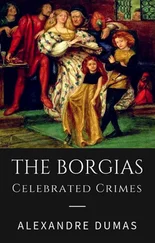The pope also celebrated his daughter’s betrothal with a succession of parties and banquets at the Vatican. He joined in the festivities with relish, undeterred by a bad cold and a loose tooth, and the fact that he was approaching his seventieth birthday, remarking cheerfully to the Ferrarese ambassador that, although his face was tied up, he would happily invite the bridegroom’s father to a wild boar hunt.
Cesare, who had returned from Naples on September 15, was exhausted after the fighting. A few days later he received a visitor — one of the rare occasions when he received them at all — lying down but fully dressed. ‘I thought he was ill,’ the surprised Ferrarese envoy wrote, ‘but yesterday evening he danced without intermission and will do so again tonight at the Pope’s palace where the illustrious Duchess [Lucrezia] is going to supper.’ Burchard also commented on Cesare’s condition: ‘The Duke has recently been ill again with his old complaint, which returned upon him after the conquest of Naples and has, some of his physicians think, affected his mind as well as his body. Although forcing himself to take part in dances and entertainments, it is seen and reported by his servants that they discover him exhausted and sometimes in pain upon his bed.’
Lucrezia, too, was beginning to feel the strain of unremitting parties and dances that the pope was so fond of attending and watching. ‘Whenever she is at the Pope’s palace,’ the Ferrarese envoy reported, ‘the entire night, until two or three in the morning, is spent dancing and at play, which fatigues her greatly.’
On September 25 the celebrations were halted when the pope and his son left Rome for a week, leaving Lucrezia once again in charge at the Vatican, while they went on a tour of inspection of the papal castles north of Rome, stopping at Nepi and, in particular, the fortress at Civita Castellana, forty miles north of Rome, which was being built under the direction of the military architect Antonio da Sangallo. The two men did the same in October, this time travelling south to view the fortresses recently seized from the Colonna family.
By the end of October, Cesare and his father were back in Rome. Perhaps it was these trips that revitalized Cesare, but he had certainly recovered his spirits by October 31, when he hosted a supper party in his apartments in the Vatican Palace to which he invited his father, his sister, and many friends, along with fifty courtesans. This particularly colourful party was described in detail by Burchard:
On Sunday the last day of October 1501 there took place a supper attended also by fifty honest prostitutes, those who are called courtesans. After supper they danced with the servants and others who were there, first clothed, then naked. After supper the lighted candelabra which had been on the table were placed on the floor, and chestnuts thrown among them which the prostitutes had to pick up as they crawled between the candles. The Pope, the Duke and Lucrezia, his sister, were present looking on. At the end they displayed prizes, silk mantles, boots, caps and other objects which were promised to whomsoever should have made love to these prostitutes the greatest number of times. The prizes were distributed to the winners according to the judgement of those present.
Four days later, so the Florentine ambassador Francesco Pepi reported, the pope failed to attend Mass in the papal chapel. It was rumoured that he was ill, no doubt the after-effects of Cesare’s party, at which, according to Pepi, the elderly pope had spent ‘the night until the twelfth hour with the Duke who had brought into the palace that night, singers and courtesans; and all night they spent in pleasure, dancing and laughter.’ Rather less reliably, the Perugian chronicler Francesco Matarazzo reported that the pope had all the lights put out, and then all the women who were there, and as many men as well, took off all their clothes, and there was much play and festivity.’
Lucrezia was again seen to be enjoying herself when, a few days after the game with the chestnuts and candles, there was a display of animal lubricity inside the Vatican. Burchard described how a farmer had brought some mares through the Viridaria gate by the palace carrying loads of wood for the market and
when the mares reached the piazza of St Peter’s, some of the palace guard came up and cut through the straps and threw off the pack saddles and the wood in order to lead the mares into the courtyard immediately inside the palace gate. Four stallions were then freed from their reins and harness and let out of the palace stables. They immediately ran to the mares, over whom they proceeded to fight furiously and noisily amongst themselves, biting and kicking in their efforts to mount them and seriously wounding them with their hoofs. The Pope and Lucrezia, laughing with evident satisfaction, watched all that was happening from a window above the palace gate.
Cesare was evidently not present on this occasion; and it appears that there was at this time a growing friction between father and son, the pope becoming increasingly annoyed by his son’s ‘turning day into night and night into day,’ as one of the Ferrarese envoys put it, and extremely hard to pin down to a meeting to discuss affairs of state.
It seemed as though Cesare, increasingly independent, elusive, and self-assured, and liable to fly off the handle at the least hint of criticism of his actions, no longer valued the advice of his father and certainly rarely sought it. Cesare’s arrogant atheism was another bone of contention since, although his father’s morals were widely held to be deeply corrupt — indeed, Agostino Vespucci told Machiavelli that it was ‘known to everyone that His Holiness brought every evening to the Vatican twenty-five women or more… so that the palace is manifestly made the brothel of all filth’ — the pope was scrupulous in the outward observances of his religious duties and had an apparently sincere devotion to the cult of the Virgin Mary.
When wearing his black mask by day, Cesare naturally became an object of curiosity on the streets of Rome; but men who stared at him soon learned that it was dangerous to do so. Cesare had one man arrested and imprisoned for apparently making a critical remark; that night his hand was cut off, his tongue ripped out and attached to the little finger of the severed hand, and the whole grisly ensemble was hung out of the prison window for all to see. Yet another, guilty of some unknown offence, was ‘secretly strangled and his body cast into the Tiber.’ Men naturally grew evermore wary in Cesare’s presence.
‘He cannot tolerate insults,’ his father confided in conversation with the Venetian ambassador. ‘I have often told him that Rome is a free city and that everyone may speak and write as they please. Evil is often spoken of me but I let it pass. The Duke replied to me, ‘It may be true that Romans are accustomed to speak and write as they please but I will teach people to take care what they say about me.” He was as good as his word — more than one man had a hand struck off or his tongue ripped out for writing or speaking mockingly of the Duke of Valence.
Uneasy as relations between the pope and Cesare were from time to time, both remained devoted to Lucrezia. Indeed, the pope patently adored his daughter, the ‘apple of his eye,’ and, useful as her marriage to Alfonso d’Este would be to both of them politically, providing a reliable alliance with Ferrara, both father and brother looked upon it as a sacrifice, one that would bring Lucrezia’s inevitable departure from Rome.
Meanwhile, Duke Ercole’s ambassadors continued to send favourable reports regarding the behaviour of the girl soon to be his daughter-in-law. ‘Lucrezia is a highly intelligent, gracious and extremely graceful young lady, modest and lovable,’ one envoy reported in November 1501. ‘She is also devout and dutiful as a Christian. Tomorrow she will go to confession and intends to receive communion during Christmas week.’
Читать дальше











